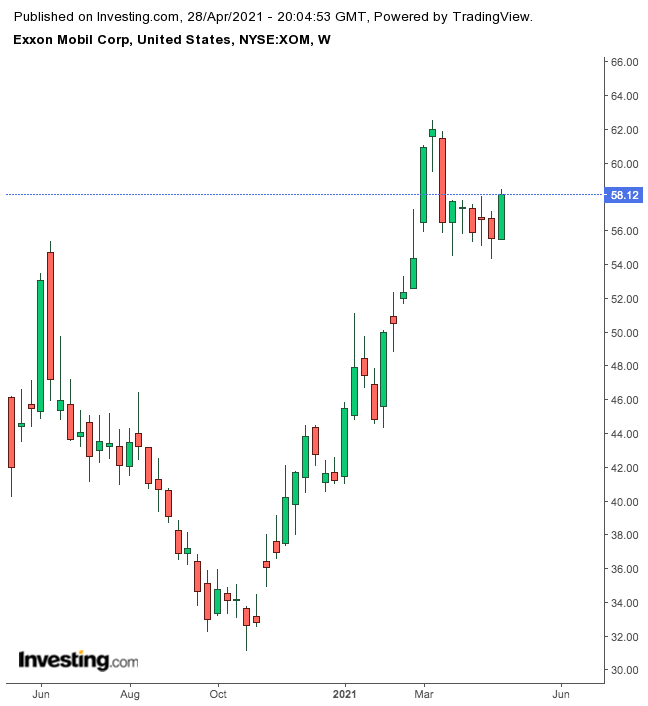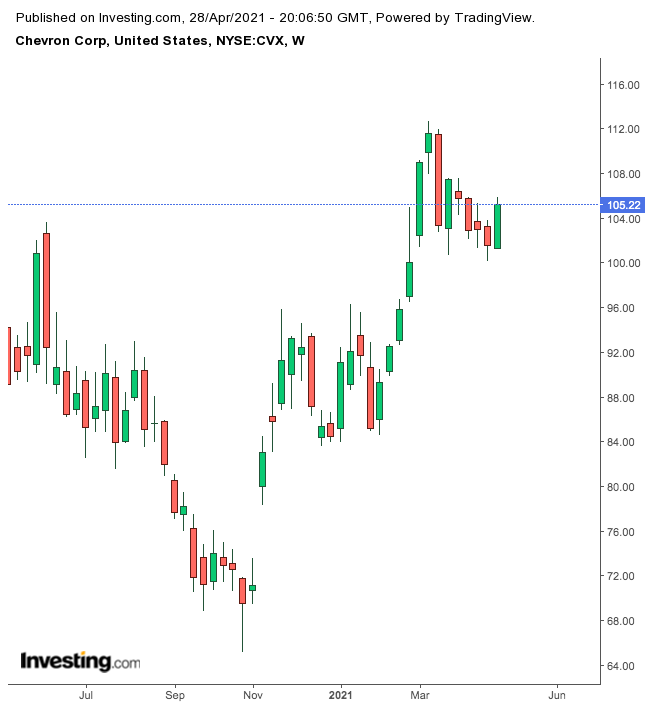The recovery in oil prices over the past year has eased financial pressures on big producers, who suffered one of their worst annual performances in decades during the pandemic. When two of the energy sector's supermajors report Q1 earnings on Friday, Apr. 30, ahead of the open, investors will be focusing on their cash generation, something that's needed to balance their books.
The latest trend in oil markets suggests that energy stocks have passed the worst of the pandemic-driven crisis, as oil demand slowly increases, fuelled by both OPEC+ production cuts and countries reopening after COVID-19 lockdowns.
Yet, the improving demand-supply equation doesn’t mean that the largest U.S. oil producers—ExxonMobil (NYSE:XOM) and Chevron (NYSE:NYSE:CVX)—are out of the woods. The pandemic has loaded their balance sheets with debt as they borrowed to cope with the 2020 crash in oil markets and fund their dividends.
While announcing its fourth-quarter earnings 2020 in January, Exxon reported its first annual loss in at least three decades, taking a $19-billion impairment charge, with cash flows swinging to negative $20 billion after dividend payouts were included.
Chevron, on the other hand, performed better than Exxon, as the California-based energy giant avoided major expansion plans during the past five years as it focused instead on spending controls. In 2020, Chevron paid out more cash in dividends ($9.7 billion) than it spent on capex ($8.9 billion). That hasn’t happened for Chevron in at least 30 years.
With the combination of higher oil prices, tight spending and asset sales, the two biggest North American producers are expected to show higher sales when compared with the previous quarter. Exxon will likely report an 18% jump in revenue for the quarter that ended on Mar. 31 to $55.18 billion, while Chevron should post a 26% surge in sales, according to analysts’ consensus forecasts.
Improving Cash Flows
Despite these improving fundamentals, some analysts believe these giants aren’t in a position to return more cash to their shareholders. The Texas-based Exxon has said it will maintain its $15-billion annual dividend, while paying down debt if oil and gas prices remain at current levels. JPMorgan sees Exxon’s free cash flow rebounding to $19.6 billion this year, giving it a sizable surplus with which to reduce borrowing.

Of the five supermajors, Chevron has the best balance sheet and “strong prospects” for a share buyback, according to HSBC analyst Gordon Gray, as stated in a Bloomberg report. The California-based company said in March that it should generate $25 billion of free cash over and above its dividend through 2025 if Brent crude remains at $60.

Goldman Sachs, on the other hand, is forecasting the largest jump in oil demand, fuelled by the global economic recovery amid the COVID-19 vaccination rollout.
In a note to clients on Wednesday it said:
“The magnitude of the coming change in the volume of demand—a change which supply cannot match—must not be understated.”
Bottom Line
The major oil procedures in the U.S. have seen the worst of the pandemic-triggered demand collapse. Tomorrow’s earnings release will likely show that their cash generation is improving and they’re in a better position to pay dividends from their own pockets and reduce their debt loads.
